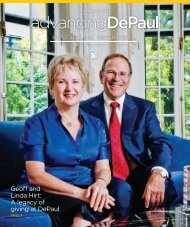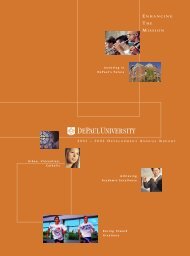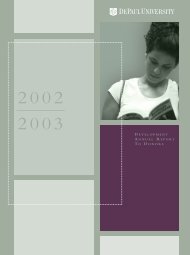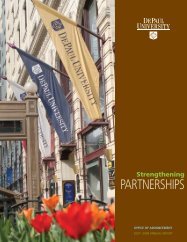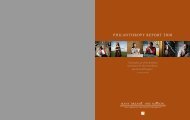fulfilling our - Alumni - DePaul University
fulfilling our - Alumni - DePaul University
fulfilling our - Alumni - DePaul University
You also want an ePaper? Increase the reach of your titles
YUMPU automatically turns print PDFs into web optimized ePapers that Google loves.
Richard Niedziela, chemistry<br />
department chair, is always thinking<br />
of new ways to make science<br />
education an opportunity for<br />
self-discovery for students.<br />
Assistant Professor<br />
Lihua Jin’s research<br />
may help advance the<br />
search for a cure for<br />
Alzheimer’s disease.<br />
“Advancing youth through education is a key component of the<br />
McGowan fund’s mission. We are pleased to partner with <strong>DePaul</strong><br />
<strong>University</strong> in developing its sciences program,” says Gin. “This new<br />
building will improve the university’s ability to train scientists, teachers<br />
and professionals, and ultimately expand <strong>DePaul</strong>’s capacity to educate<br />
underserved youth who wish to pursue a career in science.”<br />
While all recent <strong>DePaul</strong> construction has been designed to be energy<br />
efficient, the new science building is the first to seek certification<br />
through the Leadership in Energy and Environmental Design (LEED)<br />
Green Building Rating System of the U.S. Green Building Council.<br />
“This building is the future of science education at <strong>DePaul</strong>,” says<br />
the Rev. Dennis H. Holtschneider, C.M., president of <strong>DePaul</strong>. “We<br />
are committed to providing <strong>our</strong> next generation of scientists and<br />
technology workers with an education of the highest level, which<br />
will help <strong>our</strong> society to remain healthy, internationally prominent<br />
and economically strong.”<br />
According to the president, the campaign will help position <strong>DePaul</strong><br />
as a leader in 21st-century science education. “Leadership in this<br />
area includes taking action to address the need for highly educated<br />
elementary and high school science teachers,” notes Holtschneider.<br />
“The new building and an endowment for scholarships will increase<br />
<strong>DePaul</strong>’s capacity to prepare students for the key role of laying a solid<br />
foundation for science education.”<br />
Additional gifts to the campaign have come from corporations,<br />
foundations, individual donors and government agencies, including<br />
the State of Illinois’ Capital Development Board, which contributed<br />
$9 million. For more information about the Campaign for Excellence<br />
in Science, go to giving.depaul.edu/science.<br />
<strong>DePaul</strong> prepares science<br />
students for successful careers<br />
<strong>DePaul</strong>’s hands-on approach to science education has prepared<br />
thousands of graduates for success in science-based careers.<br />
These alumni are engaged in at least 60 different fields of<br />
work including urban planning, aviation and aerospace,<br />
animal science and veterinary medicine, computer and<br />
high technology, energy res<strong>our</strong>ces, environmental science,<br />
manufacturing, medical and health services, nutrition, and<br />
pharmacology.<br />
According to Richard Niedziela, chemistry department chair,<br />
that’s because science education at <strong>DePaul</strong> allows students to<br />
find out what they are really good at. “The main thing is that<br />
students get to do research and perform experiments alongside<br />
teachers,” he says.<br />
Niedziela and his students, for example, are investigating<br />
the optical — that is, light-absorbing or light-reflecting —<br />
characteristics of organic materials that represent components<br />
of atmospheric aerosols or particles. They also are involved<br />
in research to better understand the structure of particles<br />
formed from water and oleic acid, which many scientists use as<br />
proxies for natural aerosols found in the atmosphere. Both lines<br />
of research will produce data that can help scientists better<br />
identify, model or understand the properties of atmospheric<br />
particles, including those contributing to global warming.<br />
More than a dozen other <strong>DePaul</strong> science professors lead<br />
lab projects that impart practical experience to students.<br />
A sampling of their work includes:<br />
n Lihua Jin, assistant professor of chemistry, is studying the<br />
interaction of certain proteins with some metal ions and<br />
with tetracycline, an antibiotic, to better understand what<br />
causes Alzheimer’s disease and advance the search for a<br />
treatment for the condition.<br />
n Joanna Brooke, assistant professor of biological<br />
sciences, is investigating the worldwide emergence<br />
of Stenotrophomonas maltophilia, a type of bacteria<br />
resistant to many antibiotics. Maltophilia is spread by<br />
contaminated implanted devices and materials. Brooke’s<br />
research has the potential to reveal pharmacological<br />
treatments for the bacteria.<br />
n Liam Heneghan, professor of environmental science,<br />
is researching invasive plant and animal species in the<br />
Chicago area. A current research focus is the ways in<br />
which such invasions affect local ecosystems and their<br />
restoration potential.<br />
9



